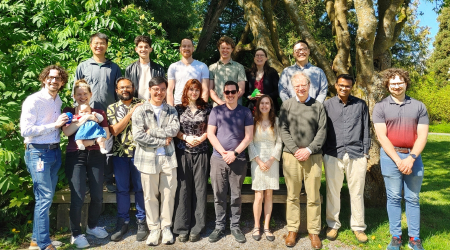University of British Columbia Physicists Celebrate Breakthrough Prize in Fundamental Physics

A version of this ATLAS press release was originally shared by the ATLAS Collaboration on Monday April 7th, 2025 here: https://atlas.cern/Updates/Press-Statement/Breakthrough-Prize.
Scientists from the University of British Columbia are among the thousands of researchers worldwide honored with the 2025 Breakthrough Prize in Fundamental Physics, awarded to the ATLAS Collaboration at CERN's Large Hadron Collider (LHC) alongside its sister experiments ALICE, CMS and LHCb.alice
ATLAS is one of the largest and most complex scientific instruments ever built. As a general-purpose particle detector measuring over 40 metres in length and around 25 metres in height, it was designed to investigate the fundamental building blocks of matter and the forces governing our universe. Its cutting-edge systems track particles produced in particle collisions at unprecedented energies, enabling discoveries like the Higgs boson and searches for new physics beyond the Standard Model.
The 'Oscars of Science'
The Breakthrough Prize specifically highlights the ATLAS Collaboration’s significant contributions to particle physics, including detailed measurements of Higgs boson properties, studies of rare processes and matter-antimatter asymmetry, and the exploration of nature under the most extreme conditions.
Known as the 'Oscars of Science', the Breakthrough Prize award for Fundamental Physics this year is awarding 100% of the $3 Million dollar prize to the CERN & Society Foundation, to offer grants for doctoral students to research at CERN.
“The Breakthrough Prize is a testament to the dedication and ingenuity of the ATLAS Collaboration and our colleagues across the LHC experiments,” said ATLAS Spokesperson Stephane Willocq. "This prize recognises the collective vision and monumental effort of thousands of ATLAS collaborators worldwide.”
The UBC ATLAS Group
The University of British Columbia and the Department of Physics & Astronomy has been at the forefront of ATLAS research contributing to the construction of the readout system of the Transition Radiation Tracker, critical for the reconstruction of the trajectory of charged particles. Professors Colin Gay and Alison Lister played key roles in data analyses from the first publication with collision data through to precision measurements of the Higgs boson and the top quark. They have been looking for signs of physics not currently predicted by the Standard Model of particle physics, looking for new symmetries, new particles and pushing the limits of what ATLAS reconstruction can do looking at particles that decay far from the collision point. They have both been using machine learning tools throughout to aid in the reconstruction of high momentum top quarks through to the discrimination between a signal of interest and background processes. Prof Lister has held a number of leadership positions including the top quark working group and analysis model group and recently has been appointed to lead the next Canadian Long Range Planning for sub-atomic physics.
“This beautiful recognition represents for me the culmination of the dedication of so many brilliant minds that collectively work towards a common goal across the globe, where everyone can contribute from undergraduate and graduate students through to senior professors, from technicians to theorists”, shares Alison Lister. “None of the achievements of the ATLAS group at UBC would have been possible without the wonderful group of students and postdocs we have had over the years who aside from hard work and inspiring ideas also provide much opportunity for camaraderie and adventure.”
As Colin Gay explains, “the projects receiving this award are an incredible story of how human curiosity about discovering how the basic building blocks of the Universe work leads to thousands of dedicated scientists from over a hundred countries collaborating together to create machines and experiments that can probe Nature at the deepest levels. It’s an amazing experience and a real privilege to work with our colleagues from around the world in this endeavour.”
While the ATLAS Collaboration celebrates the recognition of the Breakthrough Prize, its focus remains firmly on the future. The third operation period of the LHC is currently underway and preparations for the High-Luminosity LHC upgrade are advancing rapidly. The UBC team is deeply involved in preparing ATLAS for its next chapter. They are playing a leading role in the new all-silicon inner tracker (ITk) for the High-Luminosity LHC, which will increase collision rates tenfold when it begins operation in 2030.
“I am extremely proud to see the extraordinary accomplishments of the LHC collaborations honoured with this prestigious Prize,” said Fabiola Gianotti, Director-General of CERN. “It is a beautiful recognition of the collective efforts, dedication, competence and hard work of thousands of people from all over the world who contribute daily to pushing the boundaries of human knowledge.”
Congratulations, UBC ATLAS Team, for your contributions to this award-winning collaboration!
Learn More
- ATLAS Official Website: https://atlas.cern
- CERN Official Website: https://home.cern/
- HL-LHC Official Website: https://home.cern/science/accelerators/high-luminosity-lhc
- Breakthrough Prize: https://breakthroughprize.org/News/91